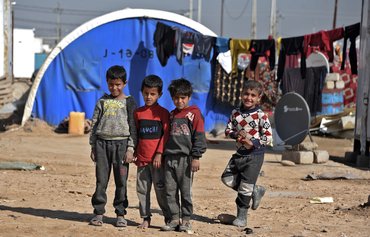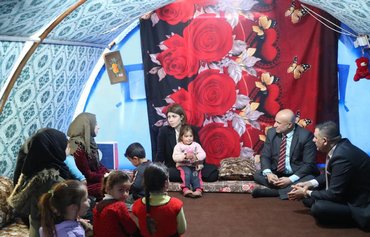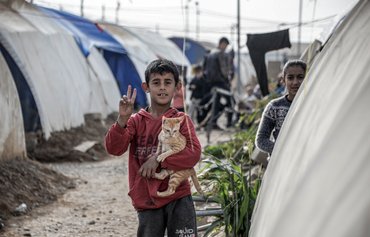Iraq has repatriated a new batch of citizens from al-Hol camp in Syria's northeastern al-Hasakeh province, bringing home about 640 people in late October, officials said.
Iraq began to repatriate its citizens from the desert camp, situated about 10km from the Iraqi border, in the summer of 2021, with repatriations picking up pace in recent months amid a broader international effort to bring al-Hol under control.
All arrivals from al-Hol "are taken directly to al-Jadaa camp" south of Mosul, Iraqi Deputy Minister of Migration Karim al-Nouri told Al-Mashareq.
"We are ready to receive the returnees, shelter them, and provide them with emergency relief and medical support," he said.
![Iraqis depart displacement camps in Ninawa province on October 18, headed for their original areas of residence. [Iraqi Ministry of Migration and Displacement]](/cnmi_di/images/2022/11/01/38388-al-hol-iraqis-600_384.jpg)
Iraqis depart displacement camps in Ninawa province on October 18, headed for their original areas of residence. [Iraqi Ministry of Migration and Displacement]
![Iraqi officials hold a meeting on October 22 with representatives of international and national organisations to discuss the plan to evacuate Iraqi families from al-Hol camp in Syria. [Centre of Excellence of the Iraqi National Security Advisory]](/cnmi_di/images/2022/11/01/38389-Iraqi-official-meet-600_384.jpg)
Iraqi officials hold a meeting on October 22 with representatives of international and national organisations to discuss the plan to evacuate Iraqi families from al-Hol camp in Syria. [Centre of Excellence of the Iraqi National Security Advisory]
Rehabilitation programmes implemented by the Iraqi Ministry of Migration and Displacement, along with 10 or so humanitarian organisations, help returning families reintegrate into society, al-Nouri said.
The programmes have been positively received by the returnees, he added, and "we are seeing a quick acclimatisation".
To date, he said, more than half of the families have completed rehabilitation and returned to their hometowns, without issues from the local population.
"The situation today in all the areas to which they have returned is normal and stable," he said, noting that Iraq's decision to repatriate citizens without security issues was taken on "humanitarian grounds".
"Their suffering must be ended and a helping hand be extended to them so they can return to their previous lives," he said.
The decision is also a necessity, he added, as al-Hol in its present form poses a serious threat to the security and stability of Syria and the region.
It has the potential to turn into a terrorist incubator, "in which children grow up with extremist ideas, in which case we would face a more violent and crueler generation", he said.
Accelerated repatriation efforts
Iraq is committed to bringing all its citizens home, in co-ordination with the Syrian Democratic Forces (SDF) and international coalition, al-Nouri said, expressing hope that the effort would contribute to al-Hol's permanent closure.
There are an estimated 25,000 Iraqis in al-Hol, out of 60,000 residents, including Syrians and nationals of 57 other countries, many of whom are the wives and children of "Islamic State of Iraq and Syria" (ISIS) fighters.
In early October, Iraqi National Security Adviser Qassem al-Araji affirmed that Baghdad is moving forward with accelerating the evacuation plan and shortening the stated five-year time frame.
According to various sources, however, al-Hol's Kurdish administration has said the pace of the repatriation of non-Syrians, including Iraqis, is still "slow".
They point to difficulties the Iraqi authorities are working to overcome, foremost that many camp residents, especially children, do not have ID documents or personal ID cards, which delays the vetting process.
There are 13 official Iraqi institutions, including five security institutions, engaged in fieldwork related to the issue of Iraqis in al-Hol, according to Saeed al-Jayashi, strategic affairs adviser at Iraq's National Security Advisory.
All of them are working with the United Nations (UN), humanitarian organisations and international partners to expedite and secure the return of Iraqi families to their homeland and respond to their needs, he said.
"We have moved significant numbers faster than other countries that have citizens in the camp, and we are keen and active in getting all our citizens back," he told Al-Mashareq.
Canada is the latest country to bring its citizens home from the Kurdish-run camps in Syria, repatriating two women and two children and charging one with supporting terrorism, AFP reported Wednesday (October 26).
Germany, France, Tajikistan and Belgium also have repatriated some or all of their citizens this year.

![Boys sit near tents at al-Jadaa rehabilitation camp for the displaced near Mosul, on May 11. [Zaid al-Obeidi/AFP]](/cnmi_di/images/2022/11/01/38387-Jadaa-rehabilitation-camp-600_384.jpg)






